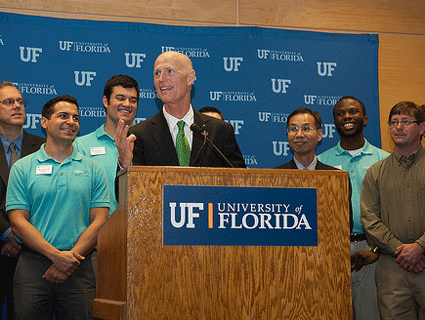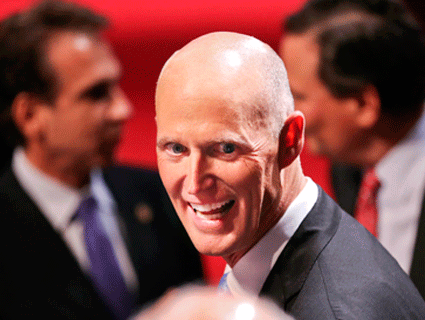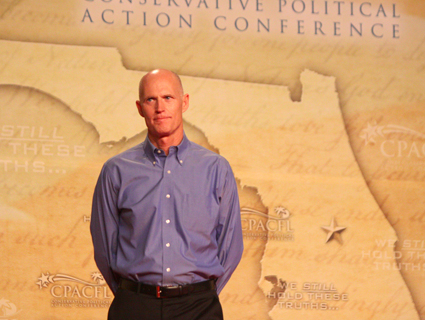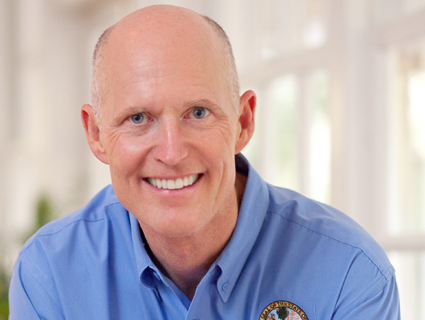
Fla. Governor Rick Scott (R), who chopped $300 million out of the higher education budget last year, talks about his plans to boost education spending.<a href="http://www.flickr.com/photos/flgovscott/8471792268/in/photostream/">Gov. Scott's Photostream</a>/Flickr
Florida Gov. Rick Scott (R) has discovered the hard way that devotion to tea party economics has a significant downside—namely that the voters really hate it.
Elected in 2010 on a wave of tea party anger, Scott took office promising to slash spending, lower taxes and shrink the size and reach of the state government. And that he did. As my latest magazine feature documents, Scott’s first two state budgets cut state funding for everything from environmental protection to education, and he made a show of rejecting millions in federal funding for high-speed rail and health care programs, just on principle.
Two years and many millions in cuts later, Scott is one of the country’s most unpopular governors. And now that Scott is facing reelection next year, he’s changing his tune about government spending. The budget he presented to the state legislature this month was nearly $10 billion larger than the one he unveiled (at a tea party rally) in 2011, and the largest ever proposed in Florida history. And for the past two weeks, Scott has been touring the state, campaign-style, highlighting all the ways he wants to spend more taxpayer money.
Scott’s new budget calls for reversing many of the most unpopular cuts he helped secure in the past two years, especially to education and environmental programs. He’s even proposed giving teachers a $2,500 raise.
A year ago, Scott was proposing $2 billion in cuts to social services and health care. This time around, he’s asking the legislature to approve more than a $1 billion increase. Some of that money would go towards helping disabled kids get skilled care at home so they don’t get warehoused in expensive geriatric nursing homes. The US Department of Justice has been threatening to sue the state because of its failure to keep profoundly disabled or medically fragile children out of institutions.
Scott’s new budget also proposes spending $10 million in additional state Medicaid funds to allow 750 developmentally disabled people who’ve been waiting for home care services to finally get them. He’s also asked for $15 million to aid seniors and other disabled adults stay out of nursing homes.
One thing the budget is still missing is any sign that Scott he intends to accept the expansion of Medicaid allowed for under Obamacare, which could potentially provide health care coverage to 1 million Floridians. But Scott’s administration has fought the expansion all the way to the Supreme Court, and his new budget suggests he isn’t changing his mind any time soon.
Still, Scott’s sudden embrace of government spending has left his erstwhile supporters—who already viewed his previous budget as out of control—confused. Jason Hoyt, an Orange County tea party organizer and radio host told the Orlando Sentinel earlier this month, “What in the world happened with Gov. Scott’s budget proposal? It just baffles my mind.”















